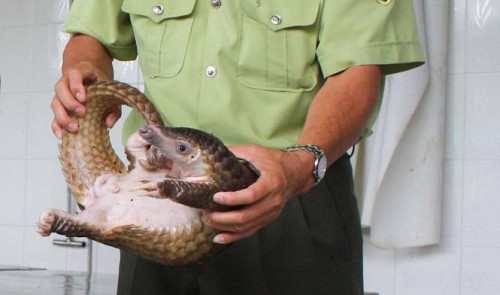The anteater is verging on extinction because of rumors spread by poachers that scales and meat of the mammal have medicinal properties and can be used to treat several diseases such as cancer, poor circulation, and psoriasis.
Anteaters have been illegally traded mainly in China and Vietnam, according to conservationists of the International Union for Conservation of Nature (IUCN).
A source from the IUCN said that over a million anteaters are believed to have been hunted in the past decade, causing the mammals to be listed as an endangered species.
In Vietnam, the illegal sale of anteater meat and scales has never stopped but silently surged in recent times although experts have confirmed that there is no scientific evidence to prove their medicinal properties.
Tuoi Tre (Youth) newspaper journalists one day contacted a man named Anh, who lives in District 12, Ho Chi Minh City, and was told, “A ‘good-looking’ anteater weighing 4-5kg is priced at VND7 million [US$310] per kilogram.
“Anteater scales fetch VND5 million [$220] to VND8.5 million [$380] a kilogram, depending on sizes.
“We have to slaughter several anteaters to have a kilogram of their scales.”
Around 50-60 big scales weigh a kilogram.
The man added he sources anteater scales from Cambodia and Africa.
Most people buy anteaters to get their meat and scales, which are thought to be able to treat diseases, while some prefer the scales for ornamental purposes only.
“Anteater scales can even treat cancer, not to mention normal ailments. I am not duping you,” Anh told the Tuoi Tre journalists.
Another poacher named Lam living on Nguyen Dinh Chieu Street in Thu Dau Mot City, which is the capital of the southern province of Binh Duong, offered to sell two anteater claws for VND300,000 ($13).
Thu, a Ho Chi Minh City-based poacher, showed the reporters a parcel of anteater scales and said they were imported from Ghana.
He said he had five kilograms of anteater scales, priced at VND8 million ($360) each.
Long, another poacher in the city, assured the journalists that he could deliver live anteaters to the homes of the buyers for VND10 million ($440) per kilogram.
He said he bought the mammals from Cambodia and transported them into Vietnam by road.
A staff named Thang of a traditional medicine shop on Tran Hung Dao Street, District 5, Ho Chi Minh City described how to process anteater scales, “They are washed before being fried till they are inflated. Then they are mixed with herbs.”
The owner of the shop said she sells 100 grams of anteater scales for VND1.1 million ($49).
She added that the price may change from time to time due to scarcity, claiming that scales of the anteater from Vietnam and Cambodia are most favored by purchasers because of their ‘good-looking’ appearance.
Processed scales are cheaper than raw ones because frying makes them heavier.
Nguyen Huu Duc, a doctor, cited medical literature as saying that anteater meat and scales are not used for the treatment of any disease.
And the so-called medicinal properties of anteater scales, tiger bone, and rhino horn are all the ‘products’ of verbal rumors spread by poachers.
There is no scientific evidence to confirm such properties, Duc underlined.
|
The anteater, which lives on insects in tropical forests, weighs between two and 35 kilograms and measures between 30 and 80 centimeters long. The giant species is up to 1.5 meters long. |
























































